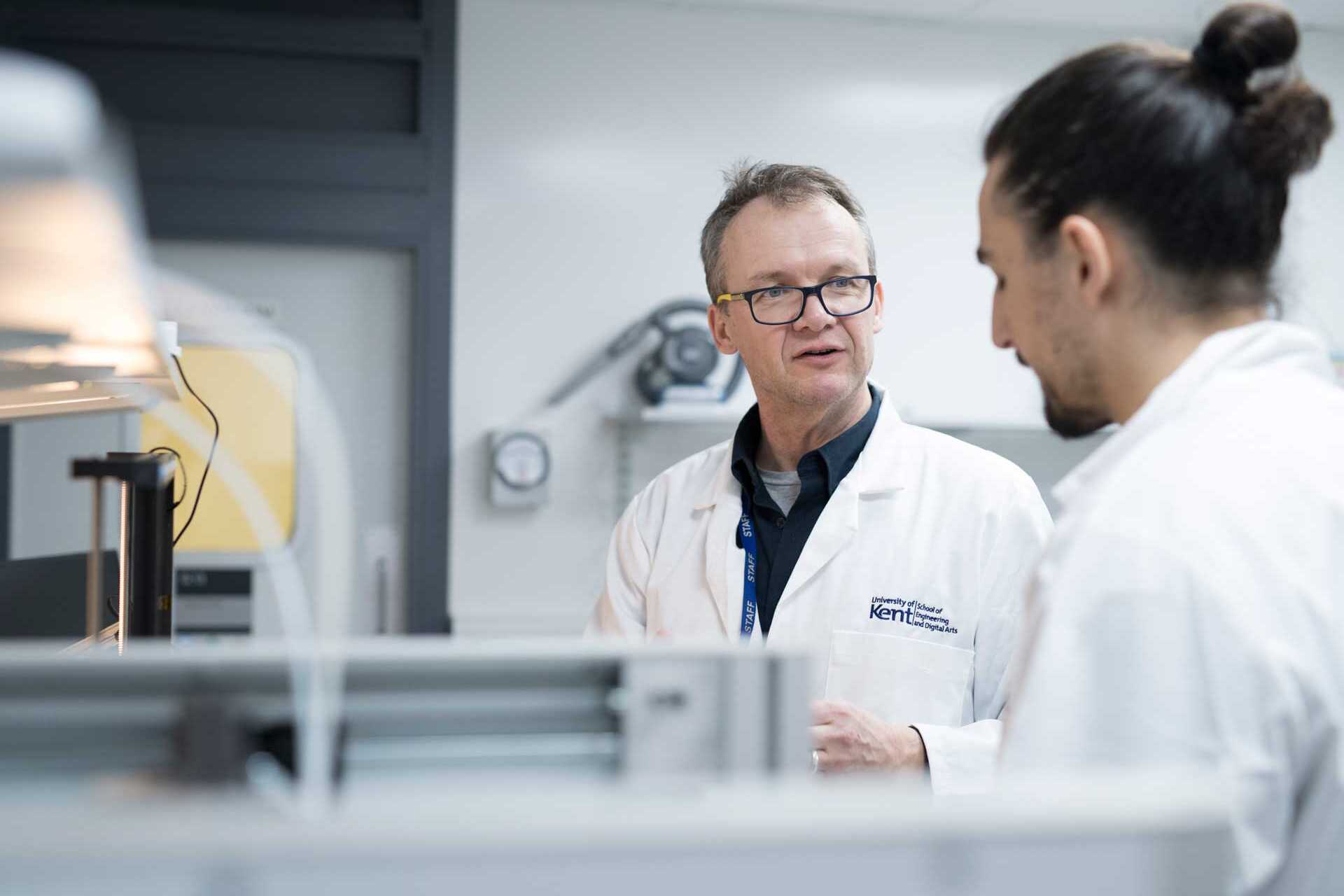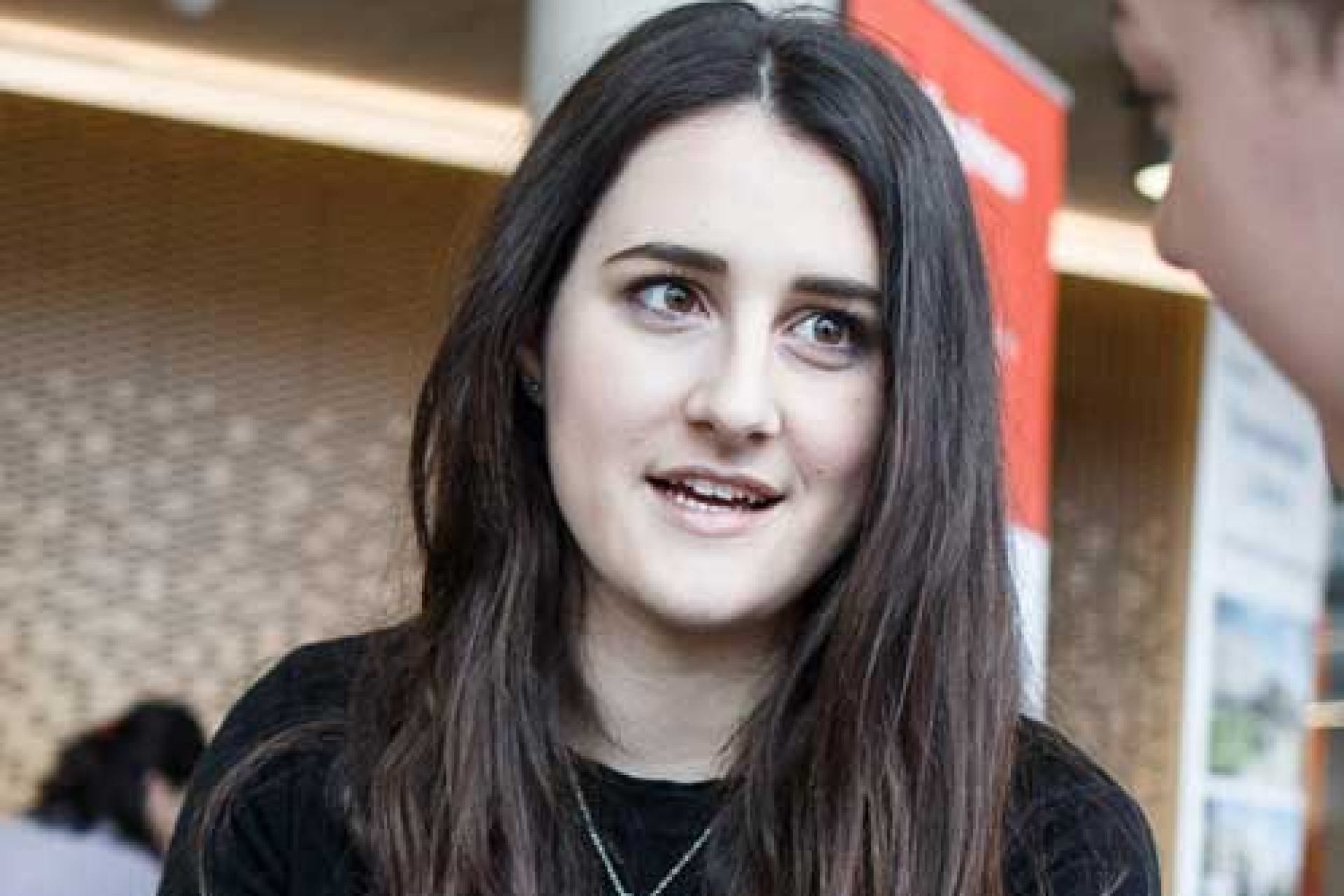
Business and research environments need engineers who can design complete solutions involving complex integrated systems. Biomedical Engineering at Kent educates engineers that can develop systems used in medical practice and biology research.
This cross-disciplinary programme is designed for students with an equally strong interest in engineering and biology/medicine. Drawing from our established expertise in engineering technologies and from the research synergies with the School of Biosciences, this degree produces engineers with a solid knowledge in biology and medical science.
Your Year in Industry takes place between your second and final years. As well as gaining invaluable workplace experience, you also have the chance to evaluate a particular career path, and, if your industrial placement goes well, you may be offered a job by that employer after graduation.

We have excellent industrial links, providing you with many placement opportunities.
of research at Kent was found to be of international quality in the most recent research rankings (REF 2021)

In a world going through technological, economic and cultural change, the demand for our graduates is increasing every year.

"Kent equipped me with the skills to problem solve and to approach tasks with an engineering mindset". We spoke to James Lewis-Cheetham.
Our typical offer levels are listed below and include indicative contextual offers. If you hold alternative qualifications just get in touch and we'll be glad to discuss these with you.
BBB including B in Mathematics plus one other STEM subject.
DMM in an Engineering subject including Further Maths/Further Maths for Engineering Technicians. Other subjects are considered on a case-by-case basis. Please contact us for further advice on your individual circumstances.
120 tariff points from your IB Diploma, including Maths (not Maths Studies) at 5 at HL or 6 at SL, or Maths: Analysis and Approaches at 5 at HL or 6 at SL, or Maths: Applications and Interpretations at 5 at HL or 6 at SL, and a science subject at 5 at HL or 6 at SL, typically H5, H6, H6 or equivalent.
N/A
The University will consider applicants holding T level qualifications in subjects closely aligned to the course.
A typical offer would be to obtain the Access to HE Diploma in a suitable subject with a minimum of 45 credits at Level 3, with 24 credits at Distinction and 21 credits at Merit.
The following modules are offered to our current students. This listing is based on the current curriculum and may change year to year in response to new curriculum developments and innovation:
Compulsory modules currently include
EENG3130 - Introduction to Programming (15 credits)
EENG3011 - Biomedical Engineering Skills (15 credits)
BIOS3070 - Human Physiology and Disease (15 credits)
EENG3050 - Introduction to Electronics (15 credits)
EENG3110 - First Year Engineering Applications Project (15 credits)
EENG3150 - Digital Technologies (15 credits)
EENG3180 - Engineering Mathematics (15 credits)
EENG3190 - Engineering Analysis (15 credits)
Compulsory modules currently include
BIOS5130 - Human Physiology and Disease II (15 credits)
EENG5170 - Control and Mechatronics (15 credits)
EENG5770 - Entrepreneurship and Professional Development (15 credits)
EENG5160 - Biomechanics (15 credits)
EENG5150 - Physiological Measurements (15 credits)
EENG5610 - Image Analysis and Applications (15 credits)
EENG5620 - Engineering Group Project (15 credits)
EENG5190 - Introduction to Fluid Dynamics (15 credits)
Compulsory modules currently include
EENG6460 - Robotics and Artificial Intelligence (15 credits)
EENG6000 - Project (45 credits)
EENG6141 - Biomaterials (15 credits)
EENG6830 - Reliability, Availability, Maintainability and Safety (RAMS) (15 credits)
EENG6760 - Digital Signal Processing and Control (15 credits)
Optional modules may include
EENG5220 - Design & Manufacturing Technology (15 credits)
EENG6770 - Communication Network and IoT (15 credits)
PHYS5130 - Medical Physics (15 credits)
EENG5090 - Virtual Reality (15 credits)
Teaching is delivered through lectures, tutorial lectures, demonstrator-led examples classes, tutor-led small group supervisions; project work; laboratory experiments and computer-based assignments. Case studies on industry hot topics and emerging technologies. In particular the first, second and third-year projects give hands-on experience of electronic design and project management.
Problem-solving workshops allow you to develop skills in applying biomedical knowledge to the solution of problems. Practical classes teach specific laboratory skills and demonstrate how they can be used to investigate biomedical systems.
Written unseen examinations; assessed coursework in the form of examples class assignments, laboratory write-ups, assessed project work, assignments and essays and class tests.
For a student studying full time, each academic year of the programme will comprise 1200 learning hours which include both direct contact hours and private study hours. The precise breakdown of hours will be subject dependent and will vary according to modules.
Methods of assessment will vary according to subject specialism and individual modules.
Please refer to the individual module details under Course Structure.
For programme aims and learning outcomes please see the programme specification.
Our graduates find employment in a huge range of sectors such as aerospace and automative industries, the armed forces and the Ministry of Defence, construction and building services, energy utilities, government agencies, manufacturing industries, medical engineering, oil and gas industries, process industries, the public sector, research establishments and transport including road and railways.
The School of Engineering holds an annual Employability and Careers Day where you can meet local and national employers and discuss career opportunities. Ongoing support is provided by the School’s dedicated Employability Officer.
Creative UK has recently relaunched their Student Membership which is available to all education Federation members, which means that University of Kent students can access free student membership. The membership is designed to propel the careers of emerging creatives.

The 2024/25 annual tuition fees for this course are:
For details of when and how to pay fees and charges, please see our Student Finance Guide.
For students continuing on this programme, fees will increase year on year by no more than RPI + 3% in each academic year of study except where regulated.*
The University will assess your fee status as part of the application process. If you are uncertain about your fee status you may wish to seek advice from UKCISA before applying.
There are no mandatory course-specific costs but please refer to our general additional costs page.
Find out more about accommodation and living costs, plus general additional costs that you may pay when studying at Kent.
Kent offers generous financial support schemes to assist eligible undergraduate students during their studies. See our funding page for more details.

We have a range of subject-specific awards and scholarships for academic, sporting and musical achievement.
We welcome applications from students all around the world with a wide range of international qualifications.

Student Life

Kent ranked top 50 in the The Complete University Guide 2023 and The Times Good University Guide 2023.
Kent Sport
Kent has risen 11 places in THE’s REF 2021 ranking, confirming us as a leading research university.

An unmissable part of your student experience.